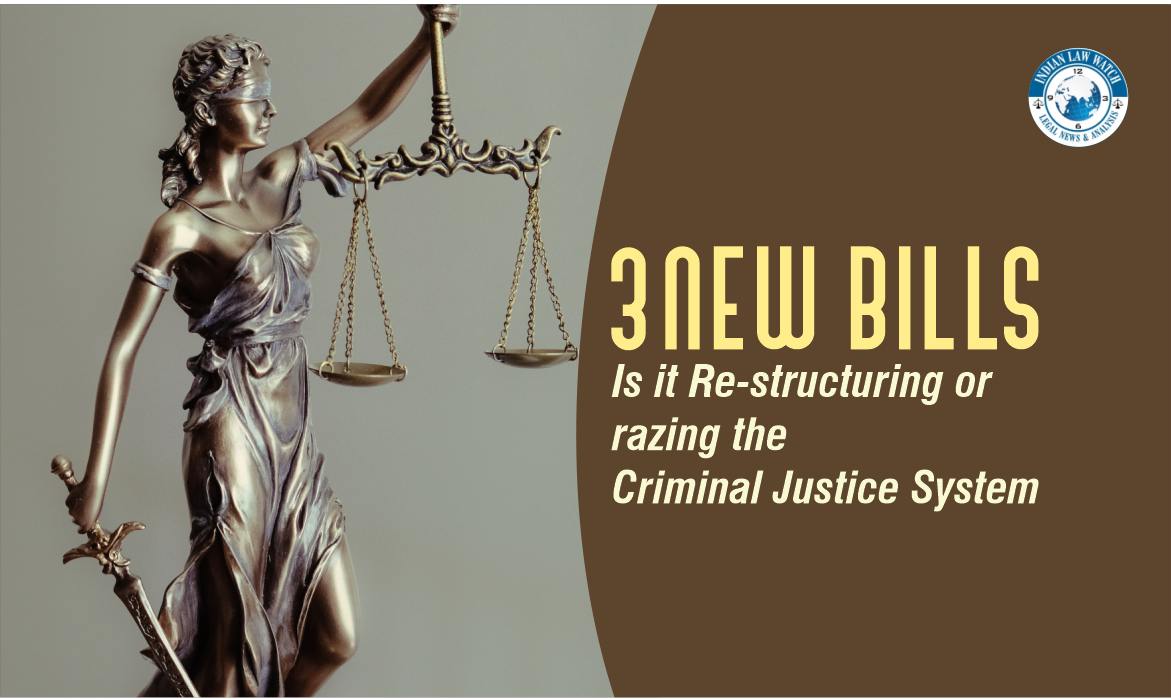

Laws introduced from the colonial era are still in force in India and one such example is the laws related to the criminal justice system. Recently three new Bills were introduced into the Parliament— Bharatiya Nyay Sanhita (BNS), Bharatiya Nagrik Surkasha Sanhita and Bharatiya Sakshya Bill — on August 11, 2023 has become subject matter of the debate on its need of introduction. If these Bills are passed, it will replace the existing Indian Penal Code (IPC), the Code of Criminal Procedure (CrPC) and the Indian Evidence Act, respectively, which were introduced during the British period. These laws were still in force with suitable amendments done from time to time. The present government aims to close this British legacy by introducing the changes that will overhaul the existing criminal justice system. The opposition, however, is strongly challenging the need for the Bill and demands that it needs to be debated by legal stakeholders and public. Presently, the Bill has been referred to the select committee of the Parliament. One of the viewpoints shared by the opposition party is that it will demolish the existing system.
Key Highlights of the Bill in the News
- The new offences that find place is mob-lynching and hate speech.
- The Bill promises to deliver justice in three years.
- The BNS Bill has provisions that seek to repeal sedition, award capital punishment for mob lynching and rape of minors.
- The Bill seeks to provide option of community service as punishment for minor offences.
- It has a provision of one year imprisonment for bribing voters during elections.
- Other proposed punishments include 20 years jail to life imprisonment for gang rape, and death penalty for rape of a minor.
- Search, and challan process will be video graphed.
- e-FIR can be lodged from anywhere, those absconding can be tried in absentia.
- update on FIR compulsory in 90 days
- Zero FIR to be codified in law,
- Time-bound approval to prosecute civil servant.
- The controversial sedition law (Section 124 A of IPC) has been repealed and replaced with a section on acts endangering sovereignty, unity, and Integrity of India (Section 150).
- The bill also would establish a 180-day deadline to submit charge sheets, which could be extended by up to 90 days.
The goal with which these set timeframes is to streamline the criminal justice system for all parties involved. To enhance transparency, the bills talks about the practices such as videography, forensic evidence preservation and certification of custody.
“Under this Bill, we have set the goal that the conviction ratio has to be taken above 90 per cent. That is why, we have brought an important provision that the Sections which provide for 7 years or a greater jail term, under all those cases forensic team’s visit to the crime scene will be made compulsory,” Amit Shah said.
Criminal Law Reform Committee
The Central government had in March 2020 constituted a Criminal Law Reforms Committee to make suggestions to revise IPC, CrPC and the Indian Evidence Act 1872. The Committee was headed by Professor Dr. Ranbir Singh, the then Vice Chancellor of National Law University Delhi and consisted of:
- Professor Dr G.S Bajpai, the then Registrar of NLU-D (Academician)
- Professor Dr Balraj Chauhan the VC of DNLU, (Academician)
- Senior Advocate Mahesh Jethmalani, and (Senior Advocate)
- GP Thareja, former District and Sessions Judge, Delhi. (Judge)
In February 2022, the Committee submitted a report to the Government, after taking suggestions from the public. In April 2022, the Law Ministry had told the Rajya Sabha that the government has undertaken a process of comprehensive review of the criminal laws. The bills were just introduced on Friday, they have been referred to the Standing Committee on Home Affairs. It still must pass out of committee and both the houses of the Parliament and receive assent from President Droupadi Murmu before becoming law.
The Concerns of the Opposition\
The media highlights were reflecting the following concerns of the opposition. The opposition is raising the issue that mob lynching was earlier covered under Section 302 (murder) of IPC in which death penalty or life imprisonment were the punishments while the present bill is watering down the lowest punishment to seven years. Hate speech is also covered according to the opposition and needs no new law. The concept of ‘zero FIRs’ and ‘e-FIRs’, both of which were launched by the United Progressive Alliance government under Dr Manmohan Singh already. The mandatory video recording of a rape victim’s statement has now been made optional under the changes. The punishment for terrorist acts and other crimes were also falsely advertised.






